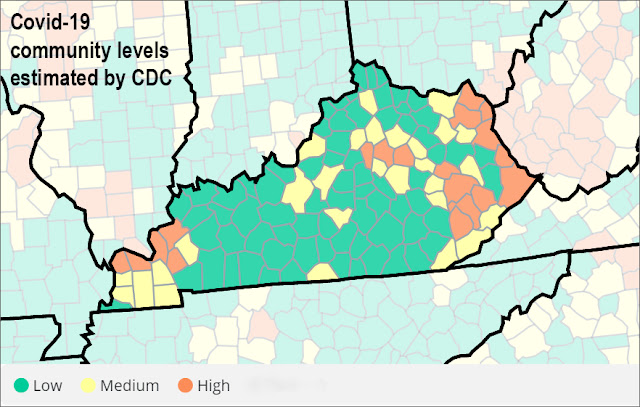 |
| Centers for Disease Control and Prevention map, adapted by Kentucky Health News |
Kentucky Health News
The federal government's coronavirus map for Kentucky shows a higher level of virus transmission and an increased risk of the Covid-19 disease.
Nineteen Kentucky counties are red on the latest Centers for Disease Control and Prevention national Covid-19 risk map, indicating a high level of coronavirus transmission. Last week, only seven were red.
Twenty-eight Kentucky counties are yellow, indicating a medium level of transmission. Last week, 21 were yellow. The rankings are based on new virus cases, hospital admissions and hospital capacity.
The red counties are Ballard, McCracken, Livingston, Crittenden and Lyon, in Western Kentucky; Woodford, Fayette and Clark in Central Kentucky; Carter, Greenup, Boyd and Lawrence in the northeast; and Martin, Pike, Wolfe, Breathitt, Knott, Perry and Leslie in Eastern Kentucky.
Six of the seven red counties from last week's map are red again this week, including McCracken, Crittenden, Pike, Greenup, Carter, and Boyd.
In red counties, state guidelines call for wearing masks in indoor public spaces, limiting in-person gatherings, limiting the size of gatherings, and social distancing.
"When your county is red, you need to really think about stepping up the things you do to keep yourself from getting Covid," Gov. Andy Beshear said at his weekly news conference Thursday, a few hours before the release of the new map. His warning was mild, but still contrasted with what he said at last week's news conference: "This is the safest we have been in this pandemic."
The 28 yellow counties are Hickman, Carlisle, Graves, Marshall, Calloway, Caldwell, Monroe, Taylor, Hardin, Nelson, Jefferson, Grant, Franklin, Scott, Bourbon, Montgomery, Powell, Jessamine, Madison, Owsley, Lee, Magoffin, Letcher, Harlan, Bell, Lewis, Rowan and Elliott.
The CDC says people in yellow counties who are immunocompromised, or at high risk for severe illness from the virus, should talk to a health-care provider about whether they need to wear a mask or take other precautions.
Beshear opened his weekly Covid-19 update by noting a figure from the state's weekly report, issued Monday: 16,004 deaths in Kentucky attributed to the disease. He acknowledged their loved ones' grief and encouraged them to seek mental-health care if in need.
"These are 16,004 children of God who will be missed by their communities, whose families are still mourning whether it happened the first day of Covid or is the most recent death," he said. "Let's remember that people are still out there hurting."
 |
| State Dept. for Public Health graph, adapted by Ky. Health News; for a larger version, click on it. |
Again, Beshear said the good news is that Kentucky is no longer seeing the deaths and serious illness that we saw earlier in the pandemic, even as cases and the positivity rate have gone up more than they were a month ago."One of the best pieces of news is it's no longer directly proportional to the number of cases or the positivity rate," he said. "But that doesn't mean it can't cause severe illness in some and it also causes real and significant disruption that all of you have seen either in your business or in your home life."
 |
| State Dept. for Public Health graph, adapted by Ky. Health News; to enlarge, click on it. |
Beshear reiterated that the best way to keep Covid-19 numbers low is to get fully vaccinated and boosted. In Kentucky, 61.4% of the eligible population, 5 and older, have been fully vaccinated and 44.9% of fully vaccinated people have received a booster shot, according to The Washington Post.
Stack, a physician, said it depends: "If you're over 60, if you are have multiple medical problems [and] on medications, you should seriously consider going out and getting that fourth dose. Cases are rising and you want to keep your protection as high as you can. If you're otherwise young and healthy and even if you're probably in your 50s, and you have no major medical problems, it's reasonable to talk with your personal physician if you would like and ask what their opinion is."
He noted that the definition of being fully vaccinated is having received two initial doses of the Covid-19 vaccination plus the first booster, and that the fourth shot is recommended for people 50 and older.
He encouraged everyone to get boosted this fall if they choose to wait because once people move back indoors, we will need added protection against the virus.
PBS NewsHour reports that the U.S. Food and Drug Administration has set a meeting in late June to evaluate data from the new vaccine formulas. Pfizer is also working on a combination shot, with some data expected later this month.
No comments:
Post a Comment